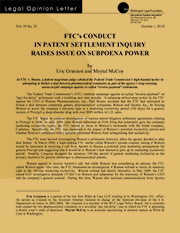 The Legal Pulse has devoted considerable attention to Watson Pharmaceutical CEO Paul Bisaro’s attempts to quash a Federal Trade Commission (FTC) subpoena he argues is being pursued abusively to support the Commission’s larger policy goals of putting an end to certain types of patent litigation settlements. Despite sworn testimony by Watson’s General Counsel to the contrary, FTC is convinced that Watson has had contacts with branded drug maker Cephalon about Watson’s application to produce a generic version of Cephalon’s Provigil medication. After a nearly unprecedented ruling which permitted Watson to depose FTC officials about the facts underlying the subpoena, Magistrate Judge Alan Kay in August recommended to the federal district court in Washington, D.C. that the FTC subpoena demanding Mr. Bisaro’s testimony be enforced. Our analysis of that decision is here. Mr. Bisaro filed objections on August 31 to the magistrate’s recommendation. The matter is currently pending before Judge Kollar-Kotelly.
The Legal Pulse has devoted considerable attention to Watson Pharmaceutical CEO Paul Bisaro’s attempts to quash a Federal Trade Commission (FTC) subpoena he argues is being pursued abusively to support the Commission’s larger policy goals of putting an end to certain types of patent litigation settlements. Despite sworn testimony by Watson’s General Counsel to the contrary, FTC is convinced that Watson has had contacts with branded drug maker Cephalon about Watson’s application to produce a generic version of Cephalon’s Provigil medication. After a nearly unprecedented ruling which permitted Watson to depose FTC officials about the facts underlying the subpoena, Magistrate Judge Alan Kay in August recommended to the federal district court in Washington, D.C. that the FTC subpoena demanding Mr. Bisaro’s testimony be enforced. Our analysis of that decision is here. Mr. Bisaro filed objections on August 31 to the magistrate’s recommendation. The matter is currently pending before Judge Kollar-Kotelly.
Two antitrust and competition law specialists with the law firm White & Case LLP have now weighed in on the FTC v. Bisaro controversy through a WLF Legal Opinion Letter. The paper, FTC’s Conduct In Patent Settlement Inquiry Raises Issue On Subpoena Power, authored by Eric Grannon and Meytal McCoy, offers a cogent summary of the facts of the case and the larger context in which it arises – FTC’s “larger, policy-driven campaign to end so-called “pay-for-delay” settlements, which are settlements of patent infringement litigation between innovator and generic pharmaceutical companies that may involve contemporaneous business transactions.” Grannon and McCoy conclude:
The FTC’s actions here reveal that the FTC is willing to stoop to “questionable” conduct to achieve its policy goals, which is particularly unseemly in an area where the FTC’s position has been rejected repeatedly by the courts.
Those actions, confirmed through Mr. Bisaro’s interrogatories of FTC officials, include:
- FTC contacted FDA about the regulatory status of applications by generic companies (including Watson) to copy Cephalon’s Provigil, which empowered FTC with confidential information unknown to Watson or any other generic maker.
- FTC had multiple conversations with a Canadian producer of generic Provigil (selling only in Canada) – Apotex – apparently about Apotex’s possible interest in obtaining Watson’s exclusive rights to distribute the generic in America. FTC claims it was only obtaining Apotex’s “expertise” about generic Provigil even though 1) FTC had easy access to drug market experts in the U.S., i.e. FDA, with whom they had already spoken about the generic drug, and 2) Apotex had received “deficiency” letters from FDA calling into question its ability to market drugs in the U.S.
- FTC contacted Watson’s outside counsel and explored the idea (through “hypotheticals”) of Watson’s selling its rights to Apotex.
- FTC followed up with Watson’s counsel, inferring that failure to reach a deal with Apotex could lead to a Commission investigation.
- After Watson decided for business reasons not to pursue a deal with Apotex, FTC subpoenaed Mr. Bisaro.
- Apotex and FTC officials remained in contact, through e-mail, after FTC issued its subpoena.
